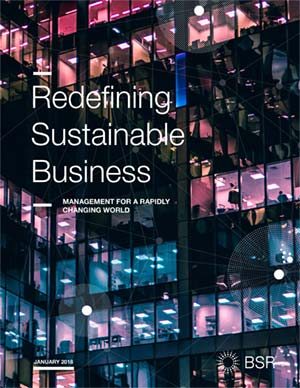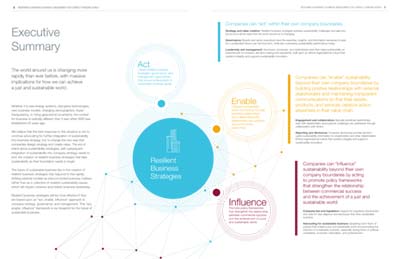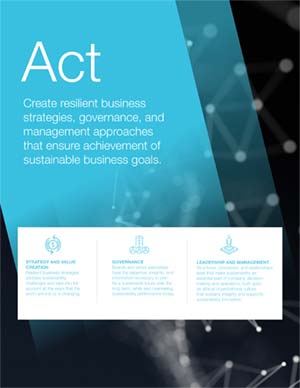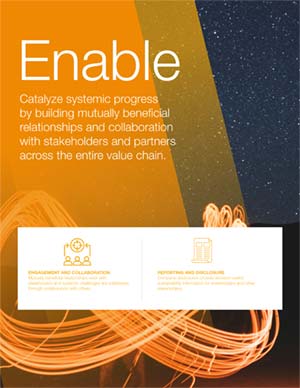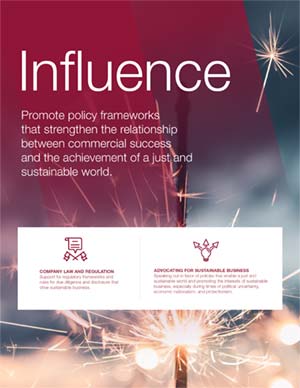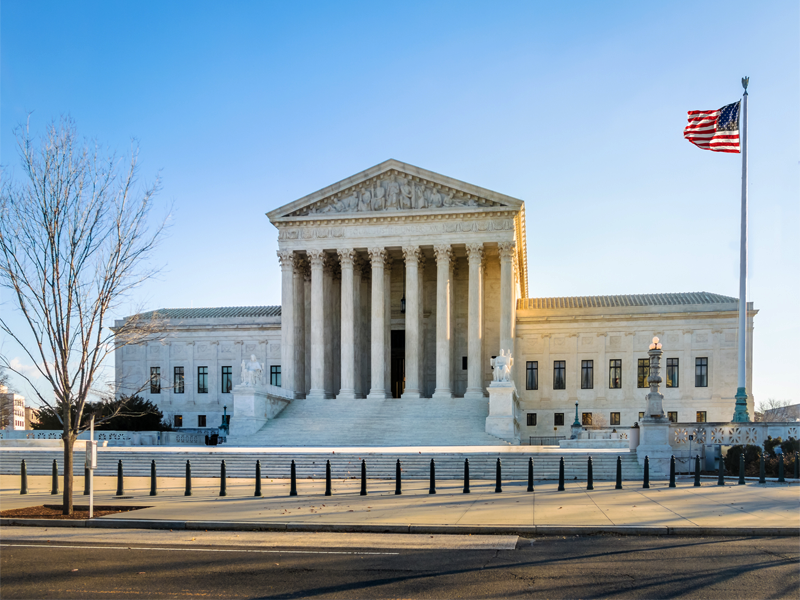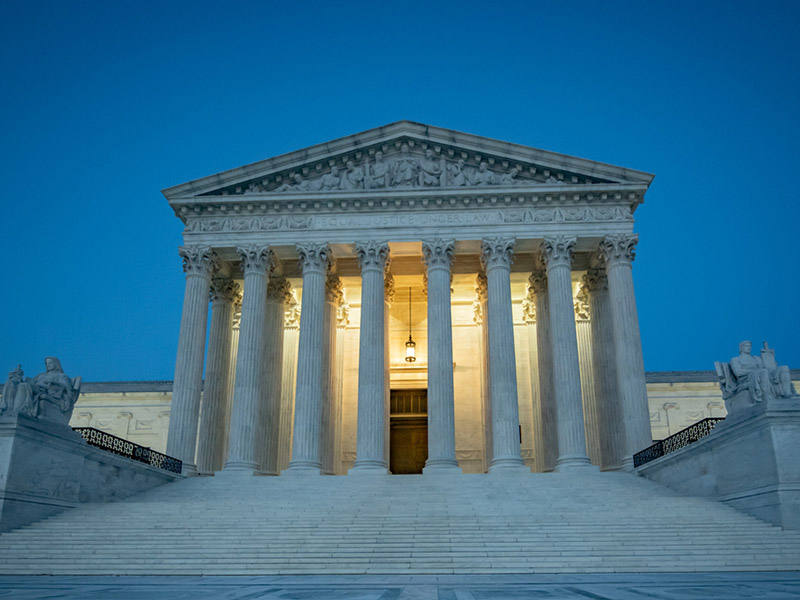Drawing on BSR’s 25 years of experience working with companies and their stakeholders, from corporate headquarters to remote operations and sourcing locations, this report presents our view of how companies can transform their strategies, governance, and management so that they are fit for a disruptive world. It builds on interviews with 50 senior sustainability leaders at member companies and our 2017 survey with GlobeScan on the State of Sustainable Business.
Why read this?
The role of business in addressing sustainability challenges has never been more important than it is today. Progress has been made on a wide range of issues, including climate change, human rights, and transparency, since 1992, the year that BSR was founded.
However, many companies continue to struggle to incorporate sustainability into their strategies, governance, and management structures. This report provides a blueprint for putting sustainability at the center of business to enable companies to play their full part in the creation of a just and sustainable world. It focuses on how sustainability is implemented inside companies.
BSR has developed a new framework to help guide companies looking to adopt resilient business strategies.
1
Act
Create resilient business strategies, governance, and management approaches that ensure achievement of sustainable business goals.
2
Enable
Catalyze systemic progress by building mutually beneficial relationships and collaboration with stakeholders and partners across the entire value chain.
3
Influence
Promote policy frameworks that strengthen the relationship between commercial success and the achievement of a just and sustainable world.
Act
Create resilient business strategies, governance, and management approaches that ensure achievement of sustainable business goals.
Strategy and Valuation
The world is changing, with massive implications for business strategy and value creation. Whether it is new energy systems, disruptive technologies, new business models, changing demographics, hyper-transparency, or rising geopolitical uncertainty, the operating context for companies is evolving.
We believe the best response to this situation is not to continue integrating sustainability into company strategy, but to develop a completely new way of designing business strategy and creating value. The era of stand-alone sustainability strategies, with subsequent integration of sustainability into company strategy, needs to end; the creation of resilient business strategies that take sustainability as their foundation needs to begin.
There are three major changes that need to happen for this new era to emerge. First, we need to create resilient business strategies that take sustainability as their foundation. Second, we need to emphasize long-term value creation and find ways to move beyond short-term performance pressures that can prevent progress on sustainability. Third, we need new tools and approaches that prioritize and measure the impact of sustainability in a language that resonates with business.
Elements of Resilient Business Strategy
Governance
The creation of resilient business strategies that embrace sustainability requires that boards play a much more significant role in the sustainable business agenda.
We believe there are specific steps that companies can take to achieve this outcome. The increased attention generated by global sustainability challenges in recent years—everything from the UN Sustainable Development Goals to the Paris Agreement on Climate Change and the UN Guiding Principles on Business and Human Rights—has significantly increased the pool of leaders in the private sector capable of and willing to rise to this challenge.
Research shows that boards and executive leadership are paying more attention to sustainability issues than ever before. Six innovations can be made to enhance the ability of boards to establish the resilient business strategies needed to create long-term value:
- Emphasize long-term value creation over sustainability oversight and performance scrutiny.
- Strengthen board stewardship of sustainability.
- Align incentives to sustainability performance.
- Recruit board members with expertise to understand the strategic implications of sustainability issues.
- Provide training on material sustainability issues.
- Create external advisory councils.
Leadership and Management
The creation and implementation of resilient business strategies will require new types of executive leadership that support organizational leadership on sustainability issues.
We believe this executive leadership transformation needs to take place in three areas—diversity, leadership style, and innovation.
Leadership Transformation
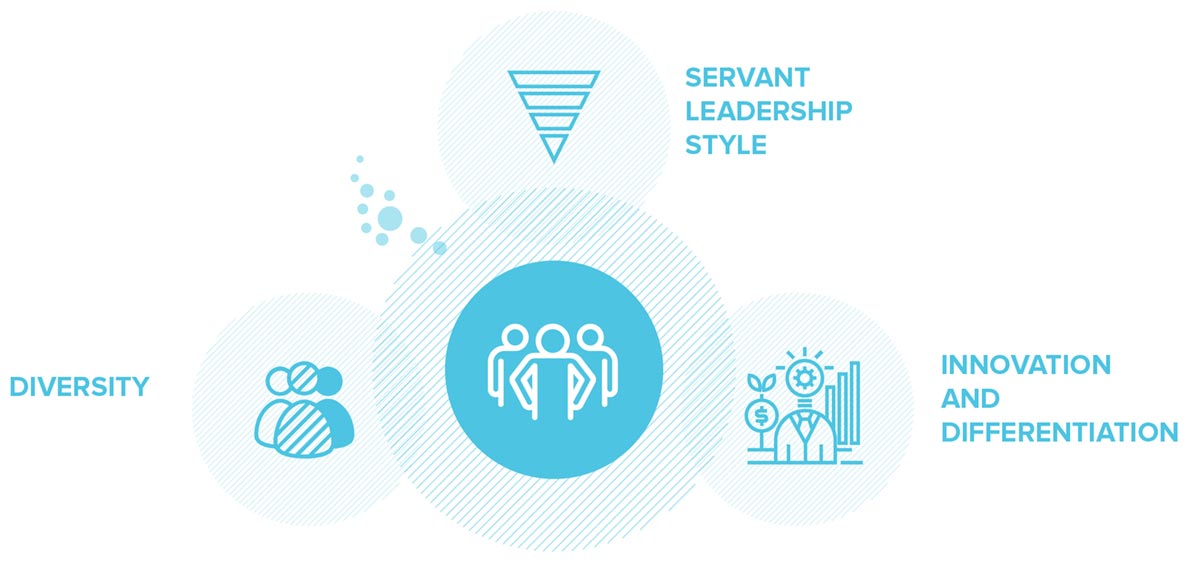
The creation and implementation of resilient business strategies will also require an overhaul of the sustainability function. We believe that the sustainability function should reimagine its future in four main ways: as the creator of value for companies, as futurists, as change agents, and as coalition builders. This requires a more deliberate, structured, and thoughtful approach to working with other functions. But if it succeeds in these four areas, then sustainability functions will thrive as an engine of innovation at a time when innovation is sorely needed.
New Job Descriptions for Sustainability Professionals
The sustainability function should reimagine its value and future in four key ways.
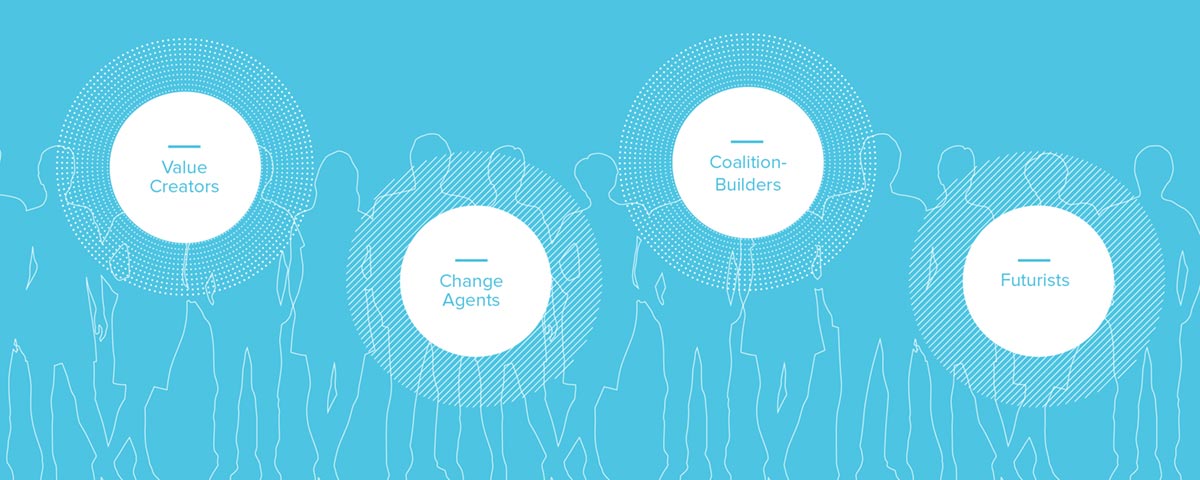
Enable
Catalyze systemic progress by building mutually beneficial relationships and collaborating with stakeholders and partners across the entire value chain.
Engagement and Collaboration
Stakeholder engagement needs an overhaul. The practice of stakeholder engagement emerged to help companies build greater trust with societal groups that might negatively affect the delivery and success of their business strategies in a material way. However, all too often stakeholder engagement remains a limited reputational risk exercise that misses opportunities to support resilient business strategy.
It is time for an approach where stakeholder engagement practices are fully equipped to support all aspects of company strategy and operations and enable meaningful interaction with a rapidly changing external environment. We believe that innovation in stakeholder engagement offers the potential to integrate new ideas into business strategy, enable the business opportunities of the future, and support the development of more inclusive societies.
Implementing this new approach will see stakeholder engagement become a critical component of corporate value and the creation of resilient business strategies, rather than a tool to manage reputational risk and avoid crises. This will lead to fundamentally new thinking about how to structure organizations, drive innovation, and measure value.
Companies need to transition from a spoke-and-wheel approach to stakeholder engagement, which puts the company at the center, to a systems-based approach that analyzes the broader environment.

Spoke-and-Wheel
This approach, which puts the company at the center as the “spoke,” can be characterized by primarily focused and time-bound consultations with the companies’ most direct and visible stakeholders, who are seen and engaged through the lens of their relationship to the company, as opposed to in relation to the broader ecosystem.

Systems Thinking
Systems thinking involves purposefully analyzing the broader environment in which the company operates, with an understanding that the company is just one actor in a wider social system that is linked to, and dependent on, external actors.
Effective stakeholder engagement will require innovation in three main areas: using systems-based approaches that capture more diverse voices; altering the purpose of engagement from consultation to collaboration; and reforming internal company engagement mechanisms to ensure that stakeholder perspectives support business strategy.
Three Dimensions of Innovation in Stakeholder Engagement
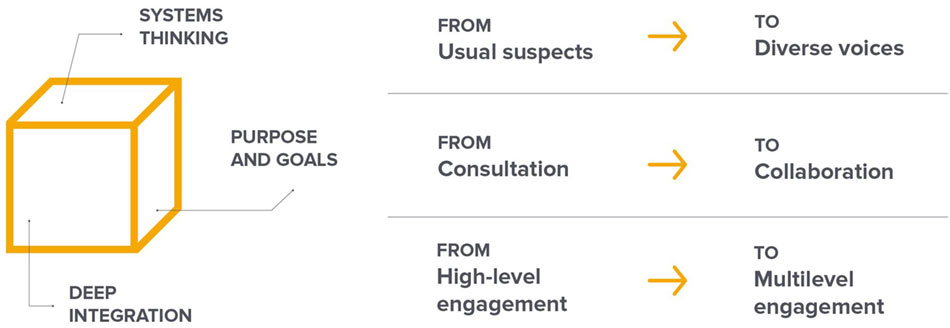
Reporting and Disclosure
Sustainability reporting has been disrupted in two important ways over the past decade, and these changes are only likely to accelerate further over the coming decade:
- Breadth and Format: An abundance of disruptive technologies and new communications platforms has massively increased expectations for what, how, and when companies communicate.
- Depth: The strengthening of expertise on a wide range of sustainability topics—from climate change and human rights to privacy and labor standards—has significantly increased expectations for the level of detail and sophistication provided by companies in their communications.
These disruptions are especially challenging for sustainability reporting because they run counter to the prevailing view that companies also need to focus on the sustainability issues that matter the most and reduce the length of sustainability reports.
We believe that sustainability reporting should not happen for its own sake, but have a clear and compelling purpose. BSR's vision for sustainability reporting is the achievement of two important outcomes: informed decision-making by stakeholders (including shareholders) and improved sustainability performance at companies. However, this vision can only be maintained in today's transformed communications context if the predominant model for sustainability reporting undergoes a significant overhaul.
Fortunately, the solution is within reach. Companies can fulfill the purpose of sustainability reporting by deploying a model based on two simple ideas: a triangular reporting framework that targets different types of information at different report users and a much closer connection between "numbers" and "narrative."
Influence
Promote policy frameworks that strengthen the relationship between commercial success and the achievement of a just and sustainable world.
Company Law and Regulations
We believe that companies can be bolder in developing a point of view on the company law and regulatory frameworks that are needed to achieve sustainability and be more proactive in advocating for that point of view.
This report so far has focused on actions companies can take to improve their strategy, governance, and performance. However, it is unlikely that this will achieve its potential without legal frameworks that create incentives for all companies to take the steps we have outlined here. Without reforms on items such as due diligence and disclosure requirements, there are limits on how far companies can go in creating a just and sustainable world.
The "know and show" model in the UN Guiding Principles on Business and Human Rights also provides an excellent conceptual foundation for legal and regulatory frameworks for other due diligence and disclosures on sustainability.
Advocating for Sustainable Business
The essence of sustainable business is ensuring positive outcomes for society, and the business voice in critical debates is an important tool that companies have at their disposal.
The sustainable business movement has focused much of its attention on ensuring that environmental, social, and governance issues have been integrated into business strategies and operations. This makes good sense, as we believe that it is the core of business that presents the greatest opportunity to mitigate sustainability risks and maximize the positive impact of business.
At the same time, companies have an important role to play in the public debate as well. This can include policy, but also business practices that can support sustainable development. We live in an age of major public debates of huge significance to sustainable business, such as the future of privacy in the age of big data, the future of work in the age of automation, and a changing energy system needed to tackle climate change. Business leaders have informed perspectives on these debates, and it is essential that these viewpoints become much more widely known.
Three Opportunities for Action
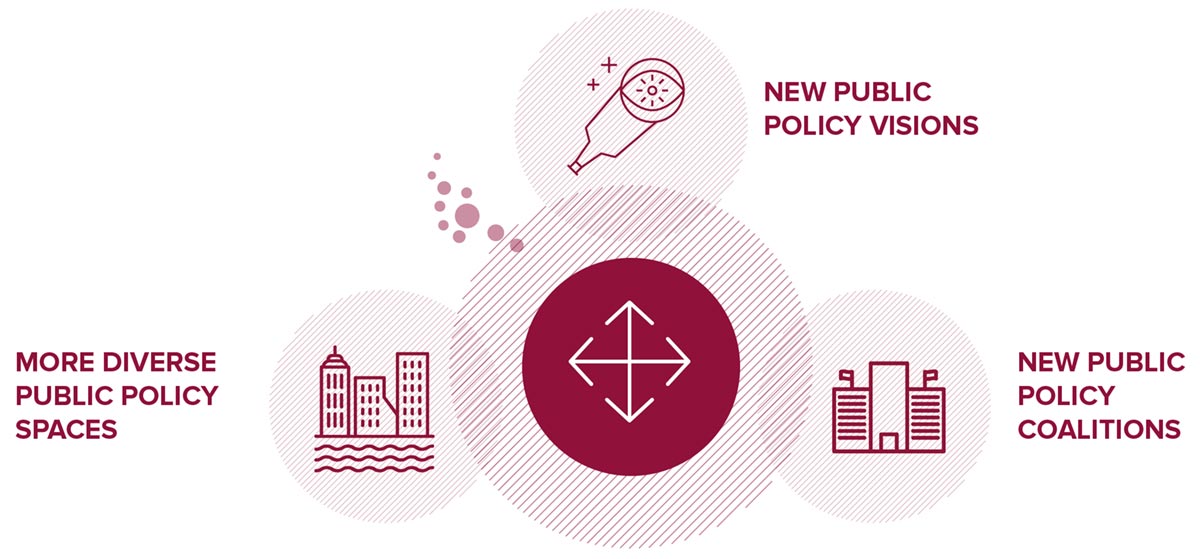
We believe there are two primary and interrelated venues for business advocacy on sustainability—with policy makers and with the public. While the nature of company engagement in these venues is often quite different, the common thread is being more assertive in developing a point of view on the importance of sustainable business models and more confident in communicating that perspective in external forums.
You Might Also Like
Let’s talk about how BSR can help you to transform your business and achieve your sustainability goals.




